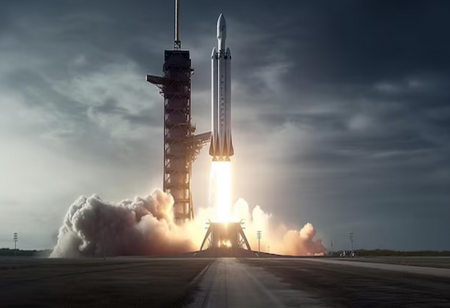ISRO will launch the GSAT-20 Satellite using Elon Musk's SpaceX Falcon-9 Rocket
By Consultants Review Team
 The Indian Space Research Organisation (ISRO) is preparing to launch its communication satellite GSAT-20, weighing 4,700kg, a project that will usher India into a new era of satellite technology. While ISRO continues to work on a rocket capable of lifting payloads weighing more than four tonnes, Elon Musk's SpaceX will launch GSAT-20 using their Falcon-9 rocket. This collaboration, scheduled for sometime in the second quarter of 2024, is a significant alliance in the area of space exploration.
The Indian Space Research Organisation (ISRO) is preparing to launch its communication satellite GSAT-20, weighing 4,700kg, a project that will usher India into a new era of satellite technology. While ISRO continues to work on a rocket capable of lifting payloads weighing more than four tonnes, Elon Musk's SpaceX will launch GSAT-20 using their Falcon-9 rocket. This collaboration, scheduled for sometime in the second quarter of 2024, is a significant alliance in the area of space exploration.
ISRO's current flagship rocket, the LVM3, has a maximum carrying capacity of four tonnes, 700kg less than the GSAT-20. This satellite, a symbol of Indian technological progress, intends to provide low-cost Ka-Ka band high throughput satellite (HTS) services. These services generally address broadband connection, as well as IFMC and cellular backhaul service requirements, with a focus on remote and underserved areas.
According to NSIL, the majority of the HTS capacity onboard GSAT-20 has already been secured by Indian service providers, however exact customer names remain unknown. This satellite has 32 beams that provide Pan-India coverage, including the Andaman and Nicobar Islands and the Lakshadweep Islands.
NSIL says that GSAT-20 will deliver an HTS capacity of roughly 48gbps, a design intended to meet the demanding service requirements of remote regions. Previously relying on Arianespace's Ariane rockets for satellite launches weighing more than four tonnes, India has shifted its focus to SpaceX, a strategic decision highlighted by the cost savings.
While a few private satellite entities in India have chosen SpaceX rockets over ISRO due to reduced prices, the Indian space agency remains focused on expanding its capabilities. ISRO is hard at work on its semi-cryogenic engine, which is critical for rockets delivering payloads weighing more than four tonnes. ISRO is planning to test its semi-cryogenic engine this year, using a propellant combination of Liquid Oxygen (LOX) and Kerosene, with to powerbooster stages of future rockets.
However, in July 2023, ISRO suffered a setback during the first hot test of an intermediate form of the semi-cryogenic engine. The test, which was conducted at the ISRO Propulsion Complex (IPRC) in Tamil Nadu, was terminated due to an unexpected surge in turbine pressure followed by a loss of turbine speed.




